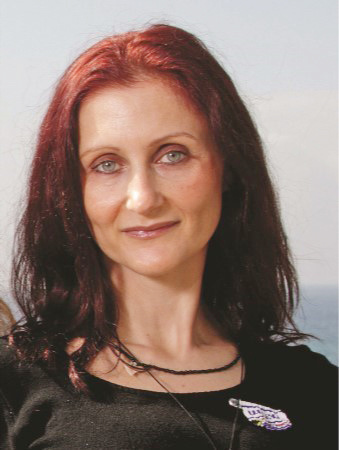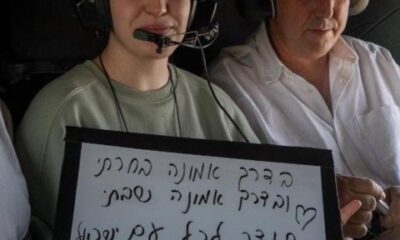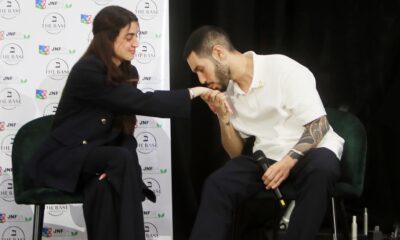
Personal Story

Going south again – a profound sense of sorrow
A beautiful bougainvillea is in full bloom. Its purple leaves bring a burst of colour. Behind the vibrant bush, a house has been decimated, scorch marks all over what’s left of it. The occupants incinerated. Kibbutz Nir Oz should be a little piece of heaven on earth in the western Negev. Instead, the kibbutz bears testament to the hell that visited this idyllic part of Israel along with others on that Black Sabbath.
Walking through the kibbutz, I caught the unmistakable stench of death. Did I imagine it? No, said our host, it never goes away. Every house tells a story of the horrors that happened inside it. I look at the reactions of the members of the foreign press who have joined two of us Israeli journalists, and wonder if they internalise the magnitude of the carnage here. One turns to another with a smile, and says, “A little bit of destruction for this community.” I give him a look that could freeze the Negev desert at high noon. This is holy ground.
Batsheva Yahalomi, whose husband, Ohad, remains captive in Gaza, took us into her looted house. In the corner of the passage are scorch marks where a grenade exploded. Ohad was wounded before being taken captive. Is he still alive? Her 12-year-old son, Eitan, was also taken. His story of captivity is devastating. Eitan was held on his own, beaten, branded, and forced at gunpoint to watch the GoPro footage that Hamas gleefully shot on the day. He wasn’t allowed to cry. Today, Eitan tries not to go to sleep because the nightmares return. Clumps of his hair are falling out.
We walk through Nir Oz, guided by Rita Lipschitz, the daughter-in-law of Oded, who also remains in captivity. Oded used to ferry cancer-stricken children from Gaza for their chemotherapy as part of the “Road to Recovery” programme. Rita hopes he is being held by someone who might recognise his good deeds for Palestinians.
Overhead, we hear the symphony of war, the unmistakable sounds of artillery shells fired, and the growling of a fighter jet. My phone buzzes with an update from the Israel Defense Forces a little later – we struck a major terror target in Gaza.
We get to the house of the Simantov family. Their shining, smiling faces beaming at us from posters on the wall. Only the family dog survived. We finally get to the kibbutz kindergarten, passing memorials to members of Nir Oz who fell in defence of their home.
I see Ariel Bibas’s name by the hook for his little school bag. I fall apart. The walls of the kindergarten are black with soot, and it’s difficult to breathe, the air is so thick and hot. Imagine what it was like that Black Sabbath. You can see where shots were fired and grenades thrown, setting fire to a place of learning, safety, and joy. Yifat Zeilar, Shiri Bibas’s cousin speaks. The tears roll down her face and her voice cracks with sorrow.
“My family, my cousin, and the love of her life, Yarden, and their two beautiful boys were taken from us on 7 October last year. My cousin was barefoot, holding her two boys with a blanket. I’m standing here today in a kindergarten. It’s where Ariel used to go to kindergarten. On 7 October, a hand grenade was thrown into this kindergarten. We don’t know if they’re alive or not. I’m here to ask for your help. I want to hold my cousin again. I want to hold those children again. I want to tell them that I’m sorry,” she cries.
Entering Kibbutz Kfar Aza for a second time this year is emotional. Though some families have returned, the kibbutz’s trees are heavy with unpicked fruit and there is signage for the residents that remain captive in Gaza. Bullet holes pockmark houses, and the path to the “young generation” neighbourhood is ominous. Walking past the armoury where the kitat konenut (anti-terrorist first-response team) engaged in heavy battles with Hamas terrorists, guide Shahar Tzuk points out the grass embankment. “On 7 October, the grass was full of the bodies of Hamas terrorists,” she says.
Tzuk continues, pointing at her modest house, the rainbow flag of the LGBTQ (lesbian, gay, bisexual, transgender, and queer or questioning) community outside. “If I was home, they would have killed me for sure. When I came back to the house afterwards and started moving stuff around, my parents yelled at me to stop because Hamas had booby-trapped fridges, cupboards, everything. I found faeces on my couch, so did others. They really wanted to humiliate us as much as possible.”
Flies still hover around the neighbourhood that was once the vibrant corridor of starter homes for the young people of the kibbutz. They remain burnt, destroyed, and decorated with signage that tells the story of who was murdered inside. Sivan Elkabetz’s house on the corner has been opened by her parents as a testimony to the slaughter that ensued. The walls and ceilings are pockmarked from grenades, bullets, and the devastating inscription from disaster-response team ZAKA on the door reads, “Human remains found on the sofa.”
Simcha Greiniman strikes me as a man whose eyes should twinkle. Engaging and kind, Greiniman is the spokesperson for ZAKA, the non-governmental organisation whose holy work it is to recover the remains of the dead so that they can be buried with the dignity afforded by a Jewish burial. His eyes are haunted and sad. In a short address at the Nova site, he describes in vivid detail not just the horrors that he and his team of tzaddikim, Jewish and Muslim, witnessed as they gently recovered bodies. He speaks of the ridicule he faced from organisations like the United Nations, where he testified on behalf of the women and girls who were sexually violated. Where was his rape kit to prove that sexual violence occurred, they asked.
I’ve been down south many times. I’ve visited the towns, kibbutzim, the Nova site, and driven the killing road, Road 232, countless times. This visit left me with a profound sense of sorrow. It engulfed me like a black fog of despair. Maybe it was the timing, mere days from the anniversary, which I thought I was emotionally prepared for, but clearly wasn’t. Maybe it was the frustration at the lack of empathy shown by the foreign press.
On 7 October 2023, something fundamentally changed in our Israeli DNA. We are tougher, harder, and much more emotionally vulnerable. The calendar told me that it has been a year since 7 October 2024, but Israelis are still on 7 October 2023. I have a feeling we will be there for a while.
- Rolene Marks is a Middle East commentator often heard on radio and TV, and is the co-founder of Lay of the Land and the SA-Israel Policy Forum.










